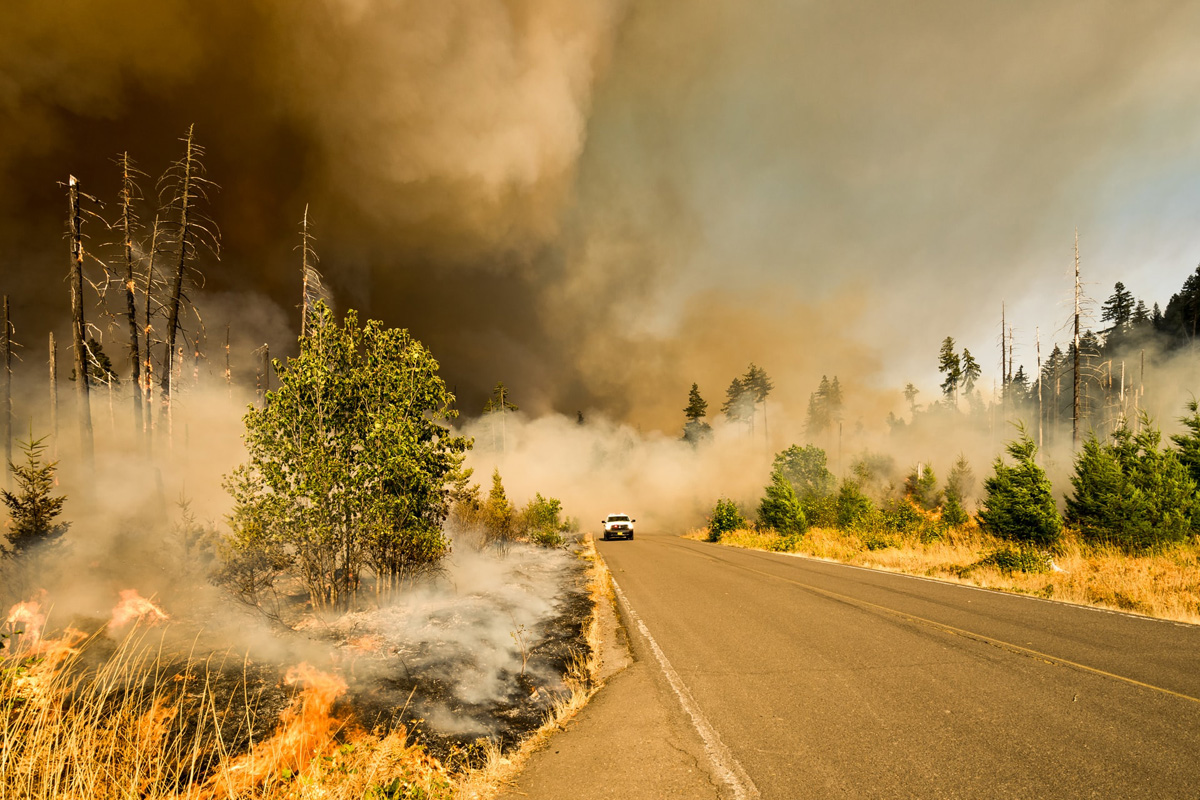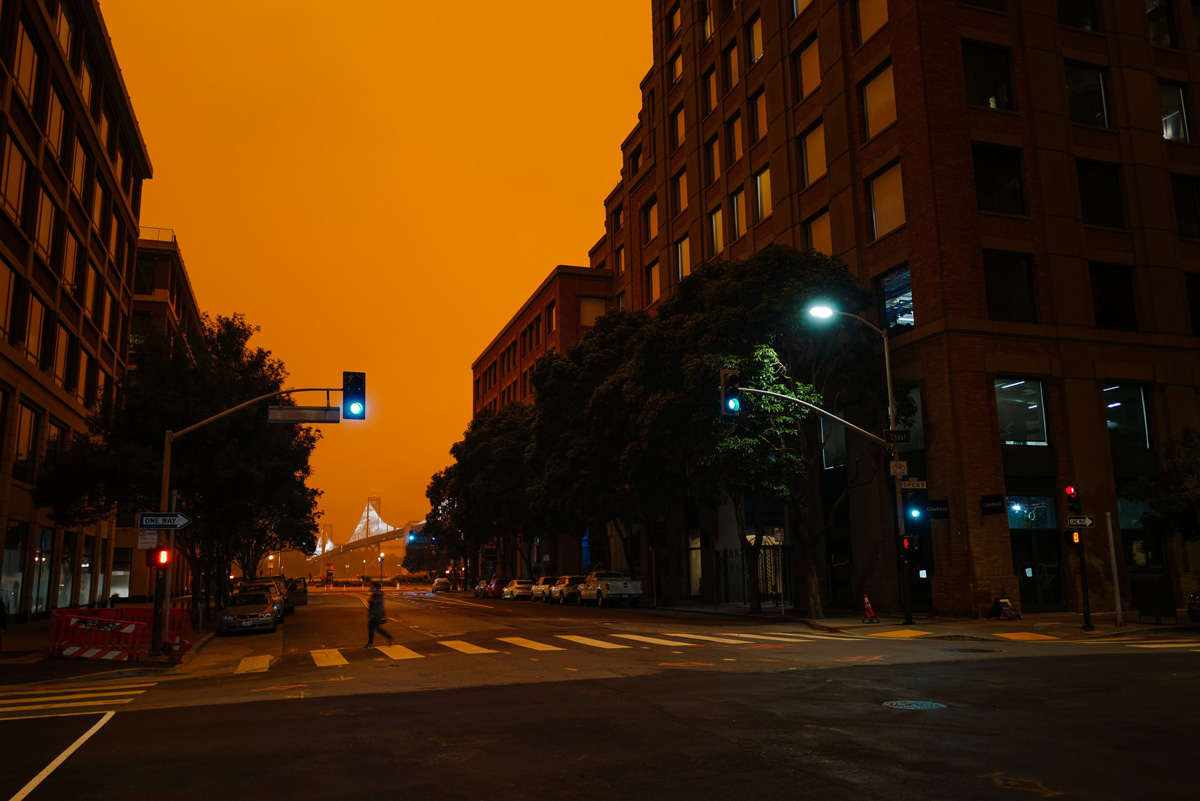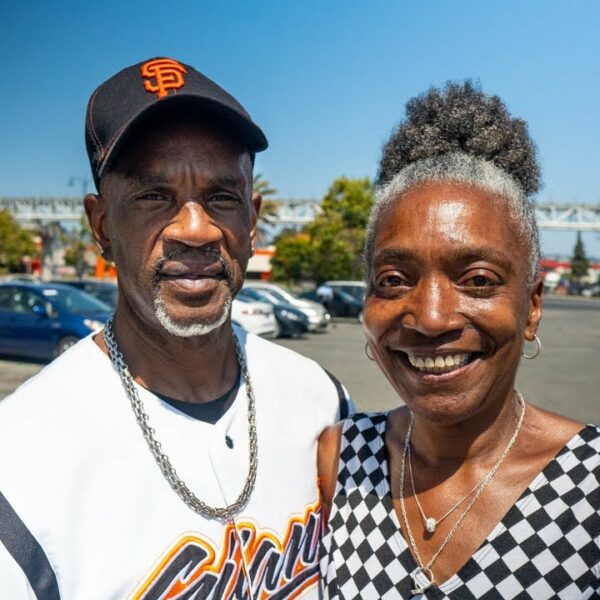You are in the future, the one you read about as a child. No, it’s not the future you looked forward to because it was full of hoverboards and flying cars. It’s that other, cringe-worthy future … the one where the sky is orange, the world is on fire, mask-clad citizens clash with authorities as governments quietly usher in Marshal Law, and people across the globe are being caged, humiliated, and tortured, all while a homeless crisis rages on.
You might have imagined such a scenario while reading a grade school adventure novel or playing an apocalyptic video game. Perhaps in your daydreams, you were even the hero who bravely ran headfirst into flames in order to save the world. However you might have imagined it, you probably didn’t envision yourself homeless and destitute. Yet that has become the reality for more than 5 million climate refugees worldwide and nobody is immune.
There Is No Vaccine For Homelessness As The West Coast Continues to Burn
From the foothills of LA to the city streets of Oregon, from the Rockies to the Great Basin, the West Coast is aflame. An eerie orange glow covers the sky. Air quality plummets. The governor of California claims that inhaling such an atmosphere is roughly the equivalent of “smoking 400 cigarettes a day”. Oregon YouTuber, Wranglerstar compares the whole experience to “being in hell”. Meanwhile, California resident Katie O’Brien sits in her car knowing her home is engulfed in flames and states, “We have our animals and our cars, and we have no place to go.”
Thus far in 2020, the United States bore witness to more than 40,000 separate wildfires, many of which were record-breaking in terms of destruction, size, number of fatalities, and number of injuries sustained. In Washington, Oregon, California, and elsewhere, missing persons are still be searched for amid the ashes where entire cities burn.
What does this mean though, for homeless people; many of whom are already uncounted, not missing, but rather, misplaced? Who will search for them? Who will become them? And how will the answers to those questions impact us all?
Oregon’s Housing Policy Advisor Shannon Singleton referred to the wildfires, the homeless crisis, and the COVID-19 pandemic as, “multiple layers of crises” and it should be noted that more disasters await as we head into flu season and the anticipated winter freeze. To put things into perspective, in the year 2018, according to the most recent statistic on record, approximately 1.2 million US citizens were displaced as the result of natural disasters. At least 50,000 of them were survivors of the Paradise, California campfire, one of the deadliest wildfires to date. Bear in mind the fact that many people who survived the 2018 wildfire are still homeless. They are left to their own defenses to battle even more flames as emergency resources dwindle.
President and CEO of Chico, California’s Community Housing Improvement Program, Seana O’Shaughnessy summed things up with the following comment,
“Precarious housing leads to negative health, work, and education outcomes when folks are recovering from the trauma of the near-death experience and now, we have the layered-on trauma and worry of COVID-19.”
Across California, Washington, and Oregon, a total of 5 million or more acres have been ravaged by wildfires. We are still tallying up the death toll, counting dilapidated buildings, and figuring out how to prevent homelessness for evacuees of these current fires. However, we additionally have to consider the hundreds of thousands of people who are already homeless. Many of these individuals could be experiencing PTSD after surviving a previous wildfire that likely destroyed their homes, their office buildings, their children’s school buildings, and all of their worldly possessions.
Unique Challenges Are Faced by Climate Refugees and People Experiencing Homelessness During a Wildfire Outbreak and an International Virus Threat
Due to the very nature of having multiple tiers of disasters afoot, climate refugees and people already experiencing homelessness have to face some really unique challenges. Among them are:
- The risk of suffocation. There is no social distance between the sky and the smog as homeless people try to take cover but lack places to breathe in fresh air. In the COVID-era, most public spaces are closed, which means the threat of suffocation is quite real. Too much exposure can also lead to coughing, dizziness, and wheezing. Long-term effects can include cancer-causing mutations.
- The risk of contracting COVID-19 while breathing is already compromised. Even under more desirable conditions, people enduring homelessness are more susceptible to the novel Coronavirus than their housed peers. Catching the virus while breathing has already been compromised and can have lasting adverse effects including fatality.
- Complications with FEMA eligibility and/or reimbursement. FEMA’s disaster recovery system is wrought with holes. This allows many people, especially those of low-income status, to fall through the cracks.
- Exposure to the elements. Because the sun is blocked by ash, it’s cold in places that are usually warm. This makes the looming threat of hypothermia a real possibility for many people.
- Loss of Possessions, Medicine and Identification. People suffering as a result of homelessness often lose very valuable possessions such as medication (which might need to be stored at a specific temperature) and identification (which they will eventually need in order to acquire government aid in the form of housing, employment, and financial assistance).
Climate Change is the Link that Binds Human Suffering to Nature’s Plight
COVID-19 is a virus. Wildfire is a natural disaster. Homelessness is a social dilemma. These three components don’t seem connected at first. Look a little bit closer, however, and you’ll find that they are, indeed, connected. Each of them is a cause for, and indirectly a result of, climate change.
In a riveting Time Magazine article written by CNN’S Fareed Zakaria it is argued that climate change is accelerating the instance of infectious diseases by way of expanding cities and collapsing ecosystems. Here is one direct quote that concisely summarizes the point:
“As cities expand, they bring humans closer and closer to the habitat of wild animals, making it more likely that a virus in a bat could be transmitted to a pig or a pangolin and then to humans”
Likewise, it is universally understood that climate change, with its intensely high temperatures and drying out of the foliage, has created excellent conditions for the spreading of wildfire. With each wildfire, we witness more people being displaced. Perhaps it’s time we start to embrace the idea that human suffering and nature’s suffering are intrinsically linked. Then we may recognize and rectify our situation while we still have time to do so.
Who Are You in #Apocalypse2020?
The trending hashtag says it all. The world has been permanently altered. The only thing left to do is find out if you live up to your childhood expectations.
Will you run headfirst into the flames and try to rescue your neighbors, friends, family members, or even yourself from the burning inferno? Or will you remain silent behind the screen, scrolling through your timeline as if the future hasn’t already arrived?
Everyone has a voice to lift, a letter to write, a fist to hold high in the air. Everyone has a part to play as we strive toward positive change.
Please inform your local legislators that we are desperately in need of laws that prevent homelessness caused by wildfires and laws that protect people experiencing homelessness from being exposed to fatal flames and toxic ash.














